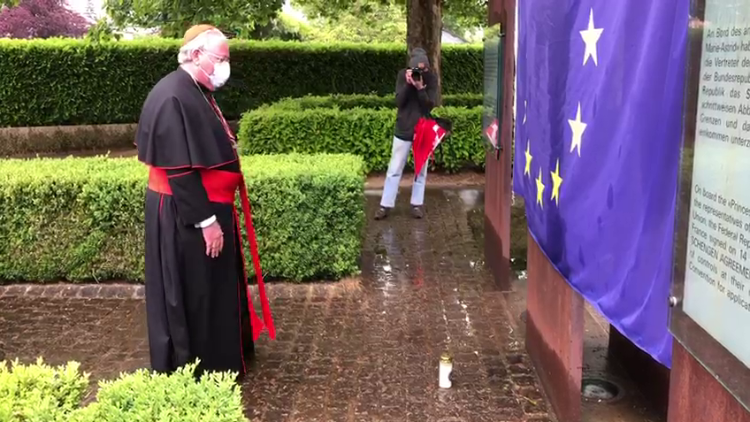On Europe Day, Cardinal Jean-Claude Hollerich urges European leaders to show solidarity in the struggle to overcome the Covid-19 pandemic and the threat of resurgent nationalism.
Europe is marking the 70th anniversary of the Schuman Declaration on Saturday, which set in motion events that eventually led to the creation of the European Union.
For the occasion, Cardinal Jean-Claude Hollerich spent the day in the Luxembourg village of Schengen, where the declaration was signed on 9 May 1950. He lit a candle “for the future of Europe and its citizens, in the context of the current Covid-19 crisis.” (See video below)
With the Covid-19 pandemic raging around the world, the president of the Commission of the Bishops’ Conferences of the European Union (COMECE) is urging EU leaders to come together in unity to help those in need.
Great European celebration
In an interview with Sister Bernadette Reis, Cardinal Hollerich said Europe Day 2020 is a “great day of celebration.”
“If you look back to the process of European integration, we can be thankful,” he said. “We have peace, a certain unity, European values, and we can be proud of what our parents and grandparents built on this continent.”
Christian roots remedy to fear
But Cardinal Hollerich warned that fear has crept insidiously inside Europe, especially with the Covid-19 pandemic. “Fear is always a bad counselor. Fear has closed the borders. Fear has brought new nationalisms, which are, in fact, national egoisms.”
He urged Europeans to look back to the founding fathers and their Christian roots. They were “inspired by their Christian faith for reconciliation, to see not an enemy in the other, but a friend who had been lost”.
Europe’s Christian roots, said Cardinal Hollerich, need to be lived now in a spirit of solidarity and fraternity, to overcome the fears that divide nations. Listen to the full interview
Compromise required
The Archbishop of Luxembourg said Europe has fought hard to respond to the Covid-19 crisis, agreeing a large bailout package.
But, he said, extensive discussions and compromise are required. “It is very difficult, when people suffer, to see these long political discussions,” he said, expressing his hope that aid will quickly reach those in need.
Opportunity in crisis
Cardinal Hollerich said this difficult moment also presents opportunities, as Pope Francis has sought to remind world leaders.
“I have met so many politicians who are very grateful to [Pope Francis] for his ideas and everything he says about Europe.”
The Cardinal said every day is a God-given opportunity to “live charity, hope, and solidarity.”
“And in such a time of crisis, Christian people who pray and discern the signs of the times can see that there is such a chance for more solidarity and more help,” he said. “Now we have the chance to show that all the discussions about European values and the European ideal are not a theory. They can be lived, and they function when we live them.”
Reopen the borders
Cardinal Hollerich also pointed out that Europe has a problem with borders, both within the Schengen area and on the EU’s external borders.
He said the closure of the internal borders have a great impact on people, due to their symbolic value. “People see the closed borders, but they do not yet see the help coming from the European Union. So I think the mood is rather negative in many countries, especially in border regions.”
Regarding the EU’s external borders, Cardinal Hollerich lamented that people have been killed while trying to seek refuge in Europe.
“It is inadmissible that people who see Europe as a haven of peace, of solidarity – who believe in our theories – get killed while trying to enter this Europe,” he said.
Europe and its politicians, concluded Cardinal Hollerich, need to put “the weakest and the poorest at the center of their concern.”



